Prince Harry and Meghan, Duchess of Sussex announced the birth of their baby boy on Monday, news that has been met with much enthusiasm. But unlike Prince William and Catherine, Duchess of Cambridge’s three children — Prince George, Princess Charlotte and Prince Louis — the newest royal baby will most likely not be a “prince.”
That’s because of a century-old decree made by Britain’s King George V in 1917, ABC news royal contributor Imogen Lloyd Webber tells TIME. “At the time, there were revolutions happening across Europe and many monarchies collapsing,” she says. “So George V wanted a slimmed-down monarchy, kind of like Prince Charles is pushing for now.”
In short, the decree says that when it comes to the monarch’s great-grandchildren, only the eldest living son (George) of the oldest living son (William) of the oldest living son (Charles) of the monarch (Elizabeth), should have “the titular dignity of Prince or Princess prefixed to their Christian names.” All the Queen’s other great grandchildren are to be known as Lord or Lady, and would not need to be addressed as “His Royal Highness” or “Her Royal Highness.”

The Queen gave William and Kate’s children special dispensation to become HRHs. In 2013, a few months before George was born, she issued a decree, updating George V’s rules, to ensure that all William and Kate’s children, male or female, would be styled Prince or Princess. The change came a few months before the U.K. Parliament updated the country’s succession laws to ensure that a new princess would not be bumped down the line to the throne by any younger brothers.
But, according to Lloyd Webber, it’s very unlikely that the Queen will make such an intervention for Meghan and Harry’s child. “There aren’t really grounds for it,” she says. Prince Harry and Meghan Markle’s baby boy is seventh in the line of succession, meaning he will probably never take the throne.
“At the end of the day, would Meghan and Harry even want that? Harry has been very honest about being troubled on some levels about being a member of the royal family,” Lloyd Webber says. “And Meghan is the first self-made woman to marry into the royal family, and she’s an American. I think they’ll lean towards the example of Princess Anne [Harry’s aunt] whose children have no titles.”
Meghan and Harry’s son was introduced to the public Wednesday morning at Windsor Castle. As Harry cradled the child in his arms, Meghan said, “I have the two best guys in the world so I’m really happy.”
The royal couple did not announce their son’s name or title during the public moment. However, he is slated to meet his great-grandmother, Queen Elizabeth II, who is currently staying at Windsor Castle, later on Wednesday.

You might expect the new baby to inherit the titles that their parents received when they married in May: the Duke and Duchess of Sussex. Lloyd Webber says Meghan and Harry’s son would probably take his father’s title of Duke when he dies. The child will likely be known in the meantime as the Earl of Dumbarton, Lloyd Webber adds.
But U.K. law still says only males can inherit dukedoms, meaning that if Meghan and Harry welcomed a daughter, she would likely just be “Lady,” as George V’s decree intended. In July, five women filed a case at the European Court of Human Rights, arguing the rules amount to “state-sanctioned sexual discrimination.” There’s not much the Royal Family can do about that alone, says Lloyd Webber. “That has to come from the House of Lords,” she says. “It’s part of a wider debate in the aristocracy.”
So in all likelihood, we can expect the new bundle of joy to have the title Earl of Dumbarton.
More Must-Reads from TIME
- Cybersecurity Experts Are Sounding the Alarm on DOGE
- Meet the 2025 Women of the Year
- The Harsh Truth About Disability Inclusion
- Why Do More Young Adults Have Cancer?
- Colman Domingo Leads With Radical Love
- How to Get Better at Doing Things Alone
- Michelle Zauner Stares Down the Darkness
Write to Ciara Nugent at ciara.nugent@time.com